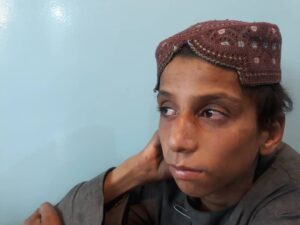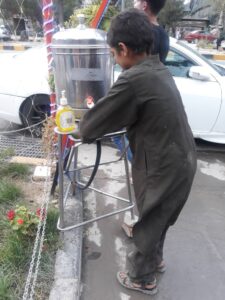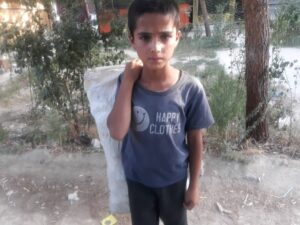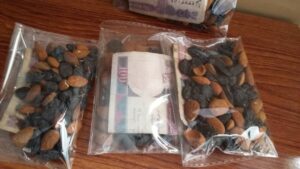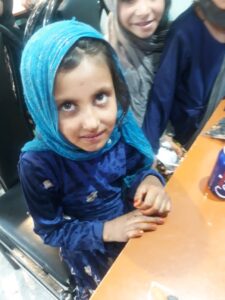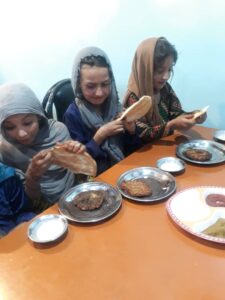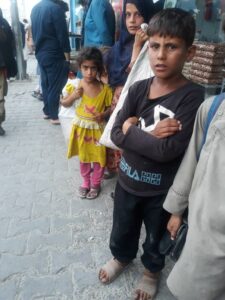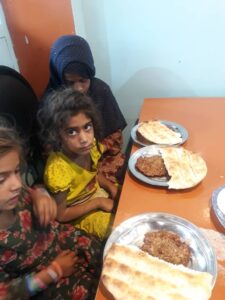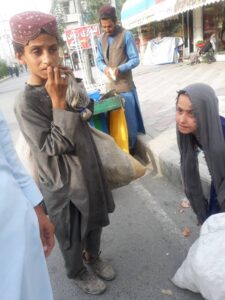 By early June, the MEPO staff had slowly and steadily offered food aid to over 100 families in Kabul, providing them with a 2 week supply of food staples in an effort to help those struggling from the economic disaster in Afghanistan. We tried to focus on women and families with young children, especially girls.
By early June, the MEPO staff had slowly and steadily offered food aid to over 100 families in Kabul, providing them with a 2 week supply of food staples in an effort to help those struggling from the economic disaster in Afghanistan. We tried to focus on women and families with young children, especially girls.
But the logistics of money and distribution were daunting. And we began to feel that maybe there was a better way, or that there were those in the society who were not getting help. We wanted to try something more creative, and focus on reaching children. The staff all talked about the poverty they were seeing on the streets, especially many children. We brainstormed with the staff, and came up with the Street Aid Program.
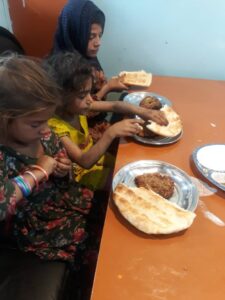 The plan was that one of the staff would go onto the streets and offer help to these children. It would be an approach that was responsive, one-on-one, flexible. It allowed for follow-up and human connection.
The plan was that one of the staff would go onto the streets and offer help to these children. It would be an approach that was responsive, one-on-one, flexible. It allowed for follow-up and human connection.
Fatima started the work. Each day, after having worked at the Garden of Flowers doing her Montessori work with the preschool children, she headed out to the streets alone.
When she saw a child or group of children on the streets, she approached them and had a conversation. This at first is quite shocking to the children: usually no one talks to them! They are invisible on the streets. But Fatima’s kindness and cheerfulness soon broke the ice, and the children began talking quietly. They answered her questions: their name, their age, where they are from, if they have gone to school, how many siblings they have, what work their parents do. 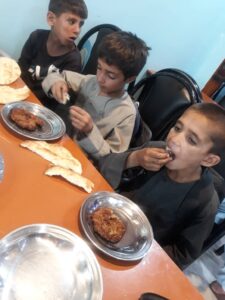
She offered the children a plastic bag containing some nutritious snacks and 100 Afs (about $1.50) and some soap. She began to take groups into a local restaurant for a hot meal. Sometimes she bought them shoes or new clothes at the local market. Sometimes she buys them a melon, or takes them for a haircut, or goes with them to the pharmacy to buy medicine for a skin condition. Sometimes she goes to a child’s home and meets the mother and offers her support if needed.
Who are these children? What are their stories? They work all day collecting plastic bottles from the streets and taking them in large bags to a ‘recycling’ center where they earn a small bit of cash to take home to their families. They are mostly boys, but there are lots of girls as well. They range from 6 to 13 years old, usually around 10 or 11. Most of them do not come from Kabul. They name a wide range of provinces as their homes: Laghman, Ghorban, Mazar, Jalalabad, and more. These children are working – they are not sitting around, or playing. Their parents may be out of work, or they may have a father in Iran, and often the parents are sick. The children are serious and quiet, but will sometimes flash a beautiful smile. When they sit at the restaurant, they wait with quiet dignity while the hot kebab is being served. In the videos we can see their thin fingers, the circles under their eyes. Some seem to be doing ok and they decline the meal, saying they are not hungry. Others are clearly malnourished and when asked, said that they had not eaten yet that day.
Fatima did this tirelessly for 3 weeks, all completely on her own after her work at the Garden of Flowers. We encouraged Fatima to take a few days off. Kabul is extremely hot and dusty these days, and this was difficult work. Razia then took over, and went to the streets with her husband helping. But Fatima could not stay away, and she continued to go out to the streets as well, on her own again. Both women are passionate about this, telling many stories about the children, the adults around them, and the Taliban’s relative support. In the first month, Fatima and Razia have reached over 500 children.
Fatima and Razia send us video after video of their encounters with these children, sometimes speaking Farsi and sometimes speaking Pushto with them, as needed. They give insight into life in Kabul from a very real source. There is no journalist, no translator. These are conversations with children who are trying to survive and helping their families to survive. We will do all we can to keep reaching these children, and even if we can only give them the wonderful feeling of a full stomach for a few hours, even that can make a difference in the life of a child.
To see some videos on our Youtube playlist, click here.

